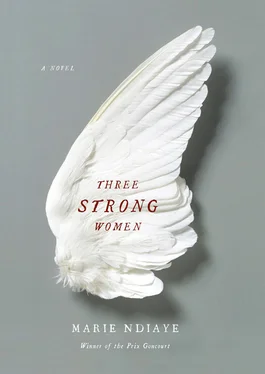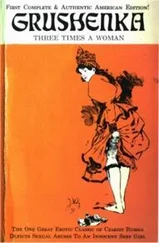“Did anyone ever find out,” he began slowly, awkwardly, “who provided my father with a gun?”
She stiffened momentarily with surprise, but that was perceptible only during the time it took her to put the sketch down and turn toward him. Her dry lips parted slightly in an annoyed, pinched smile.
“That’s all over and done with,” she said.
“Did anyone find out?”
She sighed ostentatiously, coquettishly, annoyed at his insistence.
She flopped down in an armchair, seeming almost to disappear in the flabby folds of the oversize rosy vinyl upholstery.
“No, obviously, no one ever found out, I’m not even sure if an investigation was ever carried out, you know the country, you know how things were. When all’s said and done, what does it matter? You can get hold of anything in prison as long as you can pay for it.”
Mummy’s voice once again took on that bitter, rancorous, flat, stubborn tone that Rudy had heard ever since she’d returned to France some thirty years earlier, and that her passion for angels and the almost professional way she disseminated her propaganda about them had made her gradually forsake.
He heard it again, intact, unaltered, as if the memory of that time had to be accompanied by the voice and feelings associated with it.
“Your father had the wherewithal to pay, it wasn’t a problem. He hadn’t been in Reubeuss six weeks before he’d found a way of getting hold of a revolver; as you’re well aware he knew how things were done, he knew the right people, he knew the country. He’d decided he preferred to die rather than rot in Reubeuss and endure a trial in which he knew he was bound to be convicted.”
“He told you that? That he preferred to die?”
“Well, not in so many words, but there are ways of implying such things. At the time, even so, I’d never have imagined he’d go that far: have a gun delivered to his cell. No, I’d never have imagined that.”
And, as always, that sullen, bitter, vaguely whining tone in Mummy’s voice that used to so upset Rudy in the past, creating a feeling of guilt that he hadn’t managed to make her happy merely by his kindly, considerate presence at her side, by the mere fact that he existed, the only child of this lowly woman.
“There were no individual cells, not even for six or seven people, he was in a room with sixty other men and it was so hot — or so he told me when I went to visit him — that he was practically fainting most of the time. I did what I could, I tried to get to know his guardian angel, but faced with his ill will, his negative attitude, his disbelief, what could I hope to achieve?”
Rudy wanted to ask — nearly did ask—“Was I there when my father ran his 4×4 over Salif? Did I actually see that?”
But a deep reluctance, a vivid, burning hatred, stopped him from uttering these words.
How he loathed his father for obliging him to formulate such terrible questions.
It seemed to him that whatever had really occurred between Salif and his father that afternoon, his father was at least guilty of having made it possible for such words to stick to him, even if only in the form of a question.
Nevertheless, filled with disgust, he didn’t ask that question.
It was Mummy who started speaking about his father again, perhaps because she’d sensed how much spite and disapproval had been conveyed by her silence.
“He’d convinced himself that he was done for,” she continued in her caustic, plaintive, monotonous voice, “that the police investigation, or whatever it was, considered him guilty as hell and so wouldn’t be impartial, whereas it could already be proved that this Salif had indeed swindled him, I could see that right away when I went through your father’s papers. It was, after all, justified, I don’t mean the blows and the rest, but the anger, the fight, because this Salif, when all’s said and done he should have been your father’s best friend out there, it was your father who’d given him board and lodging and taken him on as his business partner, and there Salif goes and starts doing the one thing Abel couldn’t forgive or even understand: cheating him outrageously, without a hint of a problem between them, not a change in Salif’s smile or friendly voice whenever they met. All that could have been said at the trial. I went through every estimate Salif had drawn up, for bricklaying, joinery, and plumbing, and I went to see the contractors and lo and behold they were all one way or another in cahoots with Salif or with Salif’s wife and God knows who else, it jumped right out at you that they were inflated, those estimates, and that Salif had worked it all out, how he was going to be able to line his pocket along the way. Me, I could never understand how Abel could trust that one so blindly, you have to watch your back constantly over there, people are out to jew you the whole time. Friendship, that doesn’t exist over there. They may believe in God, but the angels, they despise, think they’re funny. When you went back there to try to make a living, I knew it wouldn’t work out, I was certain of it, and as you can see, it didn’t work out.”
“If it didn’t work out,” said Rudy, “it was because of my father, not the country.”
She snickered with a little triumphant acrimony.
“That’s what you think. You’re too white and too blond, naturally they would have taken you for a ride, they would have done everything to destroy you. Even love, that doesn’t exist over there. Your wife, she married you out of self-interest. They don’t know what love is, all they think about is money and status.”
He left the room and returned to the kitchen. He felt his anger assuaged, almost eliminated, by his intoxicating, invigorating decision never to visit Mummy again, and he thought, She can come if she feels like it, thinking too, Manille & Co., that’s all over and done with, what joy, to feel young, light as a bird, in the way he hadn’t since the time he’d first met Fanta and walked down the boulevard de la République in the warm, pale, dazzling morning light, in the simple, clear awareness of his own honesty and goodness.
Slumped on his chair, Djibril hadn’t touched his milk or shortbread.
The other boy was still eating with concentration and delight. Djibril looked at him with glum alarm.
“You see, he wasn’t hungry,” Mummy said as she walked in.
Outside, as they moved toward the car, Rudy put his arm around Djibril and had the sense of having glimpsed on the ground, just in front of the Nevada, an indistinct lump of something that had no reason to be there.
But the thought was so fleeting and superficial and, besides, he was so proud and happy to be taking Djibril home to Fanta that he forgot what his eyes had perhaps seen almost as soon as he’d wondered whether his eyes had seen anything.
He let Djibril in and dropped the schoolbag at his feet, and for the first time in ages — it troubled Rudy to think — the child shot him a big wide smile.
He got in too and started the engine.
“Home,” he said with gusto.
The car moved forward.
It passed over a big, soft, dense mass that threw it slightly off balance.
“What was that?” asked Djibril.
A few yards on Rudy pulled over.
“Oh my God, oh my God, oh my God,” he murmured.
The child had turned and was looking out of the rear window.
“We’ve run a bird over,” he said in his clear voice.
“It’s nothing,” Rudy muttered, “it doesn’t matter now.”
COUNTERPOINT
WAKING FROM her daily siesta, emerging from hazy, satisfied dreams, Madame Pulmaire gazed for a moment at her hands resting contentedly on her thighs then looked toward the living-room window opposite her armchair and saw on the other side of the hedge her neighbor’s long neck and small delicate head that seemed to emerge from the bay tree like a miraculous branch, an unlikely sucker looking at Madame Pulmaire’s garden with big wide eyes and with lips parted in a big, calm smile that greatly surprised her because she couldn’t ever remember seeing Fanta look happy. Hesitantly, shyly, she raised a rather stiff, withered hand flecked with liver spots, and waved it slowly from right to left. And the young woman on the other side of the hedge, the strange neighbor called Fanta who’d only ever looked at Madame Pulmaire with a blank expression, raised her hand too. She waved to Madame Pulmaire, she waved to her slowly, deliberately, purposefully.
Читать дальше












